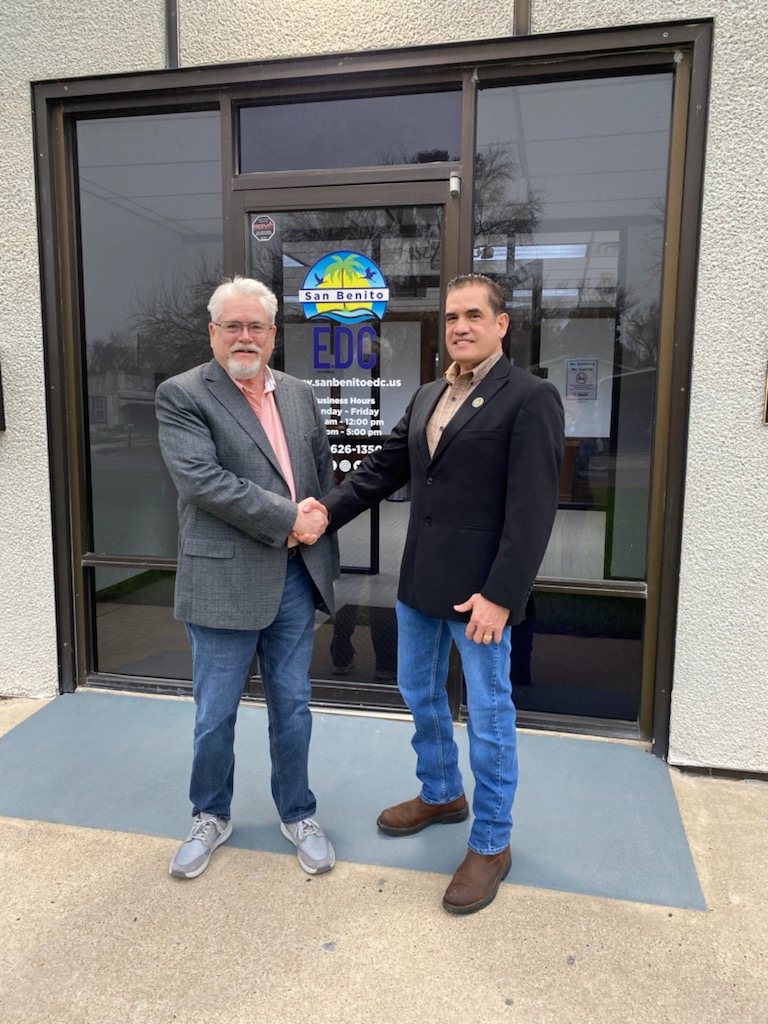
SAN BENITO — The developer behind a proposed $115 million hotel and convention center project is set to meet with prospective partners here on Thursday to discuss planning a 300-unit apartment complex at the site.
Meanwhile, the coronavirus pandemic’s production slowdown has pushed back construction plans, Linda Merritt, developer David Miles’ representative, said Wednesday.
Miles, with Friendswood-based Western Spherical Developers, is set into hold an “informal meeting” here Thursday to discuss a proposed 300- to 350-unit apartment development at the RGV Epicenter project site near FM 509 and Shafer Road, Merritt said, declining to disclose details about the groups and the meeting’s time and location.
The development would house veterans, first responders and other groups as part of what is billed as the city’s biggest project in decades, which could create about 1,000 jobs.
“There’s a tremendous veterans’ population in the RGV,” Merritt said. “It’s more workforce housing plus a wellness program plus small business programs and services. Conversations with this particular resource group are progressing in a very positive manner.”
Miles hasn’t set a construction timetable for the overall project, she said.
Construction pushed back
Early last year, Miles told commissioners construction on the proposed hotel and convention center would begin around June.
Later, he requested the city grant an extension.
In response, officials gave Miles an extension running through December, Mayor Rick Guerra said.
“I have a concern,” he said about the project. “I need to know where they’re at.”
On Wednesday, Merritt said she’d check to determine whether Miles has requested a second extension.
Miles has pushed back construction amid the coronavirus pandemic’s production slowdown that’s led to soaring materials costs, Merritt said.
“We’re going to revaluate everything,” she said. “There are supply chain issues, cost issues. Alternative materials are part of the consideration — and energy-efficient materials.”
Meanwhile, Commissioner Rene Garcia said he expected the project would take time to develop.
“This project is not going to happen overnight,” he said. “It’s something that has to take its course. If it didn’t look promising, if it didn’t seem feasible, we wouldn’t entertain the project. But I feel we’re in the right location.”
Incentives
Across a swath of farmland, Miles is proposing the city’s biggest project in decades — two hotels and a convention center amid a commercial “village” he estimated would generate $100 million in retail sales, hotel and property tax revenue for the city during a 20-year period.
During discussions, City Attorney Mark Sossi has told commissioners the project poses the city no financial risks.
Meanwhile, officials have offered Miles tax breaks and building fee rebates on the condition he complies with a performance agreement.
In November, commissioners created a tax increment reinvestment zone along the 115-acre proposed project site.
Tax increment reinvestment zones are public financing tools used to help fund economic development projects in which properties’ assessed values are frozen based on the theory those values will increase. The increased property taxes collected would make up the increment.
During the first five years of the tax zone’s 15-year lifespan, Miles would derive 100 percent of revenue generated through the project’s property taxes, Garcia said.
Afterward, the city begins reaping the tax zone’s revenue.
During the tax zone’s second five years, Miles would draw 75 percent while the city would take 25 percent of the revenue, Garcia said.
Then, during the tax zone’s last five years, he said, the city would derive 50 percent of revenue.
After the tax zone’s expiration in 2036, the city would collect all property taxes, he said.
On the commission, Garcia and Commissioners Rene Villafranco and Carol Lynn Sanchez stand behind the project.
Meanwhile, Commissioner Pete Galvan has questioned the feasibility of Epicenter’s grand scale, concerned city officials are wasting taxpayer dollars working on the project.
Background
What would become the city’s biggest project in decades would create 1,013 jobs along with an additional 1,077 jobs during its three-year construction period, Miles told commissioners.
As part of the four-phased project, he’s proposing the development of a sprawling “village” featuring two hotels, an entertainment center, a sports complex, restaurants and retail shops along with a five-acre “Crystal Lagoon.”
About four years ago, Tammy Huerta, daughter of the late Grammy-award winning singer Freddy Fender, helped spark talks with City Manager Manuel De La Rosa, Miles said.
Two House bills would help Miles fund costs through hotel occupancy tax revenue.
In 2019, city officials worked with state Sen. Eddie Lucio Jr. and state Rep. Eddie Lucio III to push for House Bills 4347 and 2199, which allow cities to spend hotel occupancy tax revenue generated through developments to fund construction of convention centers and sports and entertainment projects.



